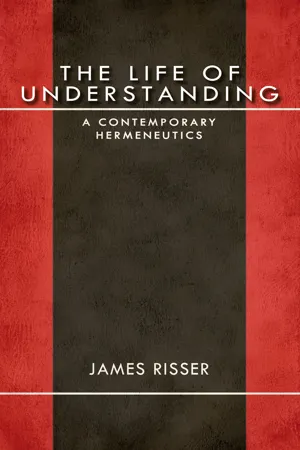![]()
NOTES
Platonic Gestures
1. See Hans-Georg Gadamer, “Reflections on My Philosophical Journey,” in The Philosophy of Hans-Georg Gadamer, ed. Lewis Hahn (Chicago: Open Court, 1997), 46–47. This essay, translated into English by Richard Palmer, was written especially for this volume but is in fact a compilation of several essays by Gadamer in which he provides a self-critique or autobiographical reflections. See especially his “Zwischen Phänomenologie und Dialektik—Versuch einer Selbstkritik,” in Hermeneutik II, Gesammelte Werke, Bd. 2 (Tübingen: Mohr/Siebeck, 1993), 3–23 [hereafter GW 2].
2. See especially Brice Wachterhauser, Beyond Being: Gadamer’s Post-Platonic Hermeneutical Ontology (Evanston, IL: Northwestern University Press, 1999).
3. See for example Gadamer’s “second book” on Plato. Gadamer, The Idea of the Good in Platonic-Aristotelian Philosophy, trans. P. Christopher Smith (New Haven, CT: Yale University Press, 1986); Gadamer, “Die Idee des Guten zwischen Plato und Aristoteles,” Gesammelte Werke Bd. 7 (Tübingen: Mohr/Siebeck, 1991).
4. See Aristotle, On the Soul (De anima), trans. W. S. Hett, Loeb Classical Library (Cambridge, MA: Harvard University Press, 1975), 415b13.
5. When examined carefully both versions of the experience of understanding are incompatible with the ontology of possibility that lies behind Gadamer’s position. It is unfortunate that these characterizations of the experience of understanding in Gadamer’s hermeneutics still remain in the shadows of current scholarship. Why this is so can be attributed to several factors: 1) the very classical problem of interpretation in which Gadamer locates his own work in Truth and Method; 2) the specific conceptuality (e.g., tradition, fusion of horizons) and the language of unity employed by Gadamer; 3) scholarship that relies on a limited focus within Gadamer’s project to make claims about the project as a whole. For a more detailed treatment of this matter see James Risser, “Gadamer’s Hidden Doctrine: On the Simplicity and Humility of Philosophy,” in Consequences of Hermeneutics, ed. Jeff Malpas and Santiago Zabala (Evanston, IL: Northwestern University Press, 2010), 5–24.
6. For a way of interpreting this connection between life and understanding that resonates generally with the work presented here, see Günter Figal, “Life as Understanding,” Research in Phenomenology 34 (2004), 20–30.
7. The issue of the later Heidegger’s continued adherence to hermeneutics is not to be dealt with here. Suffice it to say that the while the concept of understanding is replaced by Heidegger for the sake of what one could generally call the experience of thinking, the hermeneutical character of this thinking remains in force. See Risser, “On the Hermeneutics of Hermeneutic Phenomenology,” Internationale Jahrbuch für Hermeneutik 2010, ed. Günter Figal (Tübingen: Mohr/Siebeck, 2010), 19–33.
1. Memory and Life
1. Plato, Republic, trans. Paul Shorey, Loeb Classical Library (Cambridge, MA: Harvard University Press, 1970), 614b. A detailed interpretation of this story is given by Claudia Baracchi, Of Myth, Life, and War in Plato’s Republic (Bloomington: Indiana University Press, 2002), 177–218.
2. Republic, 614d.
3. One is reminded here of the image of the vessel full of holes that is described in the Gorgias. For a commentary on this association see Jean-Pierre Vernant, Myth and Thought Among the Greeks, trans. Janet Lloyd with Jeff Fort (Cambridge, MA: MIT Press, 2006), 146–47.
4. Republic, 621c.
5. See Martin Heidegger, Parmenides, trans. André Schuwer and Richard Rojcewicz (Bloomington: Indiana University Press, 1992), 118–30.
6. See Heidegger, Phenomenological Interpretations of Aristotle, trans. Richard Rojcewicz (Bloomington: Indiana University Press, 2001), 98–99; Phänomenologische Interpretationen zu Aristoteles, Gesamtausgabe 61 (Frankfurt: Klostermann, 1985), 132–33.
7. See Gadamer, “Reflections on My Philosophical Journey,” 35.
8. Plato, Phaedo, trans. Harold Fowler, Loeb Classical Library (Cambridge, MA: Harvard University Press, 1977), 118a.
9. See Charles E. Scott, The Time of Memory (Albany: SUNY Press, 1999).
10. “I recognized Socrates and Plato as symptoms of decay, as agents of the dissolution of Greece, as pseudo-Greek, as anti-Greek.” Friedrich Nietzsche, Twilight of the Idols, trans. R. J. Hollingdale (New York: Penguin Books, 1990), §2.
11. See Nietzsche, On the Genealogy of Morals, trans. Walter Kaufmann (New York: Random House, 1969), Part Two.
12. Nietzsche, Daybreak, trans. R. J. Hollingdale (Cambridge: Cambridge University Press, 1982), §52.
13. Given the way Nietzsche writes his books, it cannot go unnoticed that Nietzsche himself was preoccupied with his own sickness and the need for physical health. How much this shaped his characterization of the spiritual formation of the West and coincides with his writings remains a question. For some of his comments on the state of his own health see Nietzsche, Selected Letters of Friedrich Nietzsche, ed. and trans. Christopher Middleton (Chicago: University of Chicago Press, 1969).
14. Nietzsche, The Gay Science, trans. Walter Kaufmann (New York: Random House, 1974), Preface §1.
15. Nietzsche, Human, All Too Human, trans. R. J. Hollingdale (Cambridge: Cambridge University Press, 1986), Preface §4.
16. The Gay Scie...
